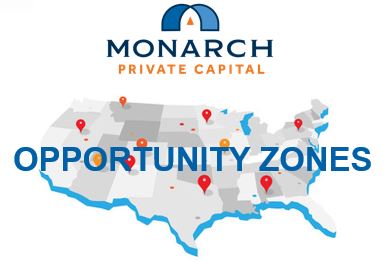Opportunity Zone Investing: Pause. Research. Invest.
Written by Billy Huger and Brent Barringer
 Hailed as the most significant tax-advantaged investment solution of its kind, the Opportunity Zone (OZ) program presents profound tax savings and investment opportunities for investors. Introduced last year in the Tax Cut and Jobs Act, the OZ program intently promotes long-term investments to stimulate designated Opportunity Zones in each state.
Hailed as the most significant tax-advantaged investment solution of its kind, the Opportunity Zone (OZ) program presents profound tax savings and investment opportunities for investors. Introduced last year in the Tax Cut and Jobs Act, the OZ program intently promotes long-term investments to stimulate designated Opportunity Zones in each state.
How does the program work? Investors place equity into Qualified Opportunity Funds (O-Funds) so the funds can use the equity to fund real estate projects and small businesses in under-sourced rural and urban neighborhoods and communities. In return for their investment, and in addition to a projected return on investment, investors are rewarded with substantial tax incentives that can last more than ten years.
How substantial are the incentives? O-Funds allow for a deferment and reduction of the federal tax liability on the gain from the appreciated assets by:
- Deferring the capital gain (including gain on property such as stock)
- Increasing the basis to decrease the amount of gain realized on a sale
- Eliminating the tax on the gain realized on the appreciated investments in Qualified OZ funds if held over 10 years
Opportunity Funds – Exceptional Opportunity
O-Funds present a phenomenal investment opportunity. “For taxable investors, in a yield-challenged environment, it provides them the opportunity to increase the yields on more conservative long–term investments. Wealth managers, high net worth family offices, and major insurance companies can now deploy capital, receive tax advantages and earn a healthy yield while meeting environmental, social, and governance mandates,” said Billy Huger, Managing Director of MPC Advisors.
Not All O-Fund Firms Are Created Equal
There can be a meaningful difference between the perception and reality of the return an investor can get from an O-Fund investment. The capabilities of the investment firms can be very different and a firm’s proven experience investing in economically challenged areas can be the difference between a good and bad outcome. Investors should tread cautiously, because not every investment firm is equipped to manage O-Funds in a way that provides the highest probability of achieving investor goals. Longevity and a proven history of success are imperative in the complex world of tax incentivized investments, especially when deploying capital in economically challenged areas.
As a nationally recognized and fast growing US tax equity firm, MPC has been deeply rooted in tax-advantaged programs since 2005 – over a decade before the O-Fund program was enacted last year.
“We’re particular about the developers and financial partners we work with – and have proven relationships with the ones we choose. We’ve already financed a number of projects that have fallen into Opportunity Zones. This means we have a history of going through project and developer diligence profitably on these projects. We have a real advantage because we’ve already been in these zones and created opportunity,” said Huger. “When we underwrite these projects, we underwrite them not only from a developer’s perspective, but from an investor’s perspective as well. We have experience with the transaction from both sides. That’s a significant differentiator between Monarch and others,” adds Brent Barringer, Managing Director of LIHTC. “We encourage all investors and constituents to do their homework prior to signing on the dotted line.”
Demand is Creating Opportunities
MPC has recently launched a series of O-Funds in response to their clients’ desire to access and leverage their reputation, experience and relationships with select institutional and individual investors, developers, and lenders. “They come to us because they know of our positive investments and have confidence in our proven, long-standing history,” said Huger. “Our deep expertise, relationships, and resources are extensive and can be used to effectively underwrite opportunities in economically challenged areas like Opportunity Zones. Being able to leverage long-term resources and in-house development teams to meet customized yield and tax attribute goals provides investors with innovative services.
Significant Programs Call for Key Thought Leaders
Barringer, who has over a decade of experience in tax-advantaged programs, shares, “Investors have a unique opportunity to capitalize on what the O-Fund program was designed to do – spur job creation and economic growth in underutilized areas. The ability to receive a true tax benefit and tax deferral by investing in O-Funds yet still receive a healthy economic return is monumental. And the bonus is that the equity goes to areas that are thirsty for investment and can create jobs and growth in the areas that need it most. Our firm has been investing in those areas prior to O-Funds – our history dates back to 2015 on other tax-advantaged investments including multifamily housing, historic preservation, and renewable energy. So, our expertise with O-Funds has been a natural outgrowth of predecessor investment classes. We see attributes in the OZ program that will make it successful as we have seen with other tax-incentivized programs in which we have expertise.”
Based on long outstanding history of past public-private tax-incentivized investment programs (including renewable energy, historic preservation and affordable housing), O-Fund investments appear to be undeniably favorable for investors. “We’re starting to see a domino effect: Not only are Fortune 100 companies considering relocating headquarters to OZs, some of the older tax-incentivized programs are fueling O-Fund development – they recognize that when housing is developed in these zones, business growth and real estate investment will follow. In fact, some affordable housing agencies give points to applicants who develop their site in an Opportunity Zone. Please note that when everyone is buying into the program and when so many constituents buy-in, it becomes a very effective public-private partnership with a self-fulfilling prophecy,” said Barringer.
ABOUT MONARCH PRIVATE CAPITAL – A HISTORY OF POSITIVELY IMPACTING COMMUNITIES
Monarch Private Capital (MPC) was founded in 2005 as a partnership between an Atlanta, GA based low income housing developer, Robin Delmer, and a high net worth family office tax advisor, George Strobel. MPC and its subsidiaries have now originated over $1 billion of credits in over 400 projects/investments. MPC invests in a variety of tax credit generating projects, including historic rehabilitation, affordable housing and renewable energy throughout the United States. MPC currently has a portfolio of over $425 million of tax credits and has created and operated more than 100 funds.
Known for its grounded history in tax credit innovation, ownership and financing, MPC works closely with government agencies to develop new customized tax credit strategies that align with the current and future financial objectives of clients.
The Company has over 100 employees and is headquartered in Atlanta with satellite offices in Charlotte, St. Louis, Springfield, MO and Sarasota and tax credit specialists in Los Angeles, Chicago, Nashville, Austin, Birmingham and Chapel Hill.
Related Posts

Forbes Article – How Corporate Boards Can Avoid ESG Investing Pitfalls
Aug 4, 2022
By George Strobel, Forbes Financial Council Member Corporate boards are under intense pressure from shareholders and other constituents to invest in ways they can tout their environmental, social and governance (ESG) […]

Monarch Private Capital and WEDI Partner to Support a New Home for West Side Bazaar
Jul 19, 2022
Buffalo’s West Side Bazaar, a program of the Westminster Economic Development Initiative (WEDI), secured Historic and New Markets Tax Credit equity from Monarch Private Capital with which to invest in […]

Monarch Private Capital Launches Its Own Podcast, Monarch Perspectives
Nov 30, 2023
New podcast series offers insight for investors and developers interested in tax credits and tax equity investing Monarch Private Capital, a nationally recognized impact investment firm that develops, finances, and […]